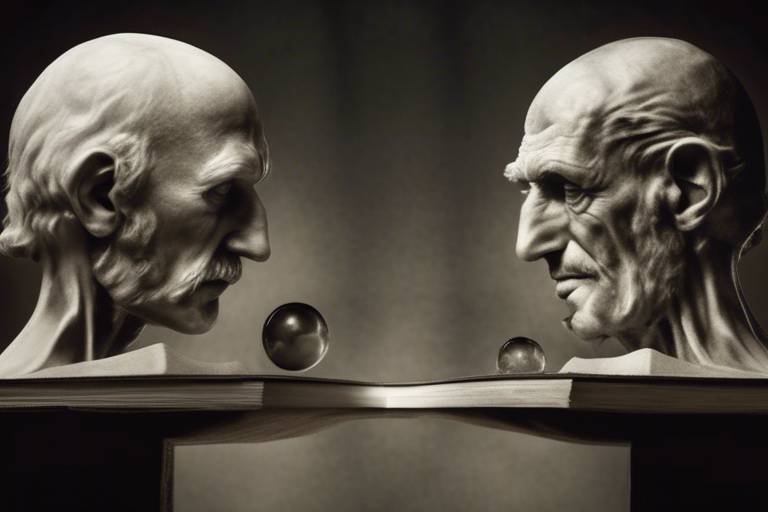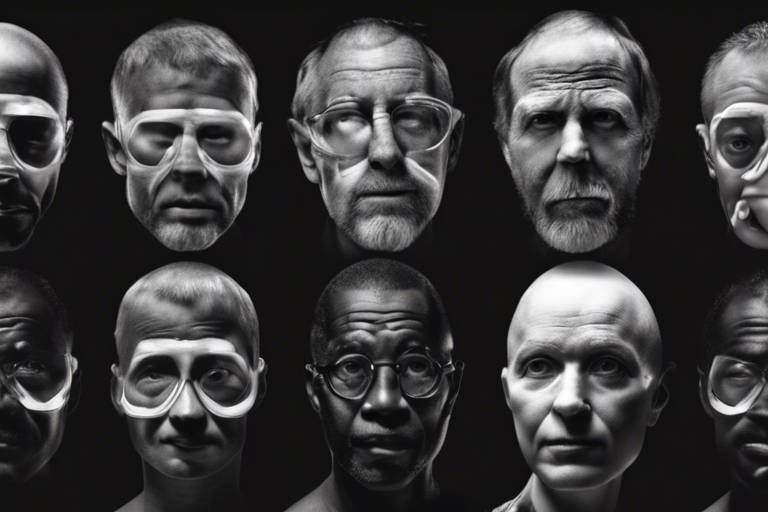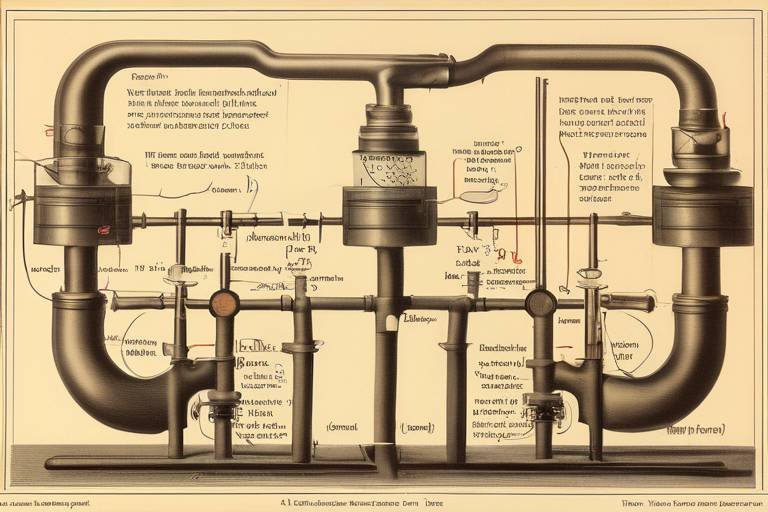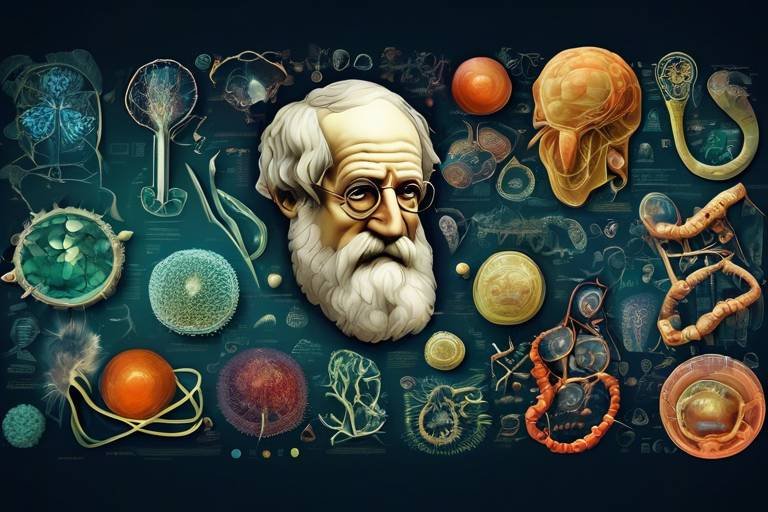Rationality in Philosophy and Scientific Approach
Rationality is a cornerstone of human thought, acting as the bridge between our understanding of the world and the methods we use to explore it. In both philosophy and science, rationality plays a pivotal role, guiding our inquiries and shaping our beliefs. But what exactly does it mean to be rational? Is it merely about logical reasoning, or does it encompass a broader spectrum of thought? This article delves into the concept of rationality, exploring its significance and application in philosophical discourse and scientific inquiry. We will uncover how logical reasoning intertwines with empirical evidence, creating a rich tapestry of knowledge that enhances our understanding of reality.
At its core, rationality is about making sense of the world around us. It involves the ability to reason logically, draw conclusions, and make informed decisions based on evidence. In philosophy, rationality is often associated with the quest for knowledge and truth. Philosophers have long debated the nature of rational thought, examining its implications for our beliefs and actions. In the scientific realm, rationality is equally crucial, underpinning the scientific method and ensuring that our hypotheses are tested rigorously against observable phenomena.
As we explore the interplay between rationality, philosophy, and science, we will highlight key figures and movements that have shaped our understanding. From the rationalists who championed reason as the primary source of knowledge to the empiricists who emphasized sensory experience, the journey through the landscape of rational thought is both fascinating and complex. Each perspective offers unique insights, prompting us to consider how we acquire knowledge and how we can apply that knowledge to navigate the challenges of life.
Furthermore, we will examine the role of logic in rationality, distinguishing between formal and informal logic. Formal logic provides a structured framework for reasoning, ensuring that arguments are valid and sound. On the other hand, informal logic plays a crucial role in our everyday reasoning, influencing our decision-making processes and interactions with others. By understanding these different forms of logic, we can enhance our rational capabilities and improve our ability to communicate effectively.
However, the path of rationality is not without its challenges. Critics have pointed out the limitations and biases that can arise in rational thought, particularly in philosophical and scientific domains. By addressing these critiques, we can develop a more nuanced understanding of rationality, recognizing its strengths while remaining aware of its potential pitfalls. Ultimately, the exploration of rationality is not just an academic pursuit; it is a vital endeavor that impacts our daily lives and our collective future.
- What is rationality? Rationality refers to the ability to think logically, make decisions based on evidence, and draw conclusions in a coherent manner.
- How does rationality relate to philosophy? In philosophy, rationality is central to the pursuit of knowledge and truth, guiding discussions on belief systems and ethical considerations.
- What role does rationality play in science? Rationality underpins the scientific method, ensuring that hypotheses are tested through logical reasoning and empirical evidence.
- What are the differences between rationalism and empiricism? Rationalism emphasizes reason as the primary source of knowledge, while empiricism focuses on sensory experience as the foundation of understanding.

The Nature of Rationality
Understanding rationality is like peeling back the layers of an onion; each layer reveals deeper insights into how we think, reason, and make decisions. Rationality is often defined as the quality of being based on or in accordance with reason or logic. However, its significance extends far beyond mere definitions. It serves as a foundational pillar in both philosophy and science, guiding our quest for knowledge and understanding. By examining rationality, we can appreciate its characteristics, implications, and the profound impact it has on our lives.
At its core, rationality embodies the ability to think logically and make decisions based on sound reasoning rather than emotions or biases. It is characterized by several key traits:
- Consistency: Rational thought is coherent and follows a logical structure.
- Clarity: It seeks to eliminate ambiguity, ensuring that ideas are expressed clearly and understandably.
- Evidence-based: Rationality relies on empirical evidence and logical arguments to support conclusions.
- Objective: It strives to minimize personal biases and emotional influences in the reasoning process.
These characteristics not only define rationality but also highlight its importance in various domains. In philosophy, rationality is essential for constructing sound arguments and engaging in meaningful discourse. It allows philosophers to explore complex questions about existence, morality, and knowledge without falling prey to irrational beliefs. In scientific inquiry, rationality is indispensable. It forms the backbone of the scientific method, where hypotheses are formulated, tested, and refined based on observable evidence and logical reasoning.
Moreover, the implications of rationality stretch into our everyday lives. Consider how we make decisions—whether it’s choosing a career path, selecting a partner, or even deciding what to eat for dinner. Rationality encourages us to weigh the pros and cons, consider the consequences of our actions, and make informed choices. However, it’s essential to recognize that while rationality is a powerful tool, it is not infallible. Human beings are inherently emotional creatures, and our decisions are often influenced by feelings, social pressures, and cognitive biases.
As we delve deeper into the nature of rationality, we must also acknowledge its limitations. The interplay between rational thought and emotional intelligence can lead to a more holistic understanding of decision-making. It’s crucial to strike a balance between rationality and our emotional instincts, as both play vital roles in shaping our experiences and interactions.
In summary, rationality is a multifaceted concept that permeates various aspects of human existence. By understanding its nature, we can better appreciate how it influences our thought processes, decision-making, and interactions with the world around us. As we continue to explore rationality in philosophy and science, we uncover not just the mechanics of reasoning but also the profound implications it has for our understanding of knowledge and belief systems.
- What is rationality? Rationality is the quality of being based on or in accordance with reason or logic, characterized by consistency, clarity, evidence-based reasoning, and objectivity.
- Why is rationality important in philosophy? Rationality is crucial in philosophy for constructing sound arguments, engaging in meaningful discourse, and exploring complex questions about existence and morality.
- How does rationality apply to scientific inquiry? Rationality underpins the scientific method, guiding the formulation, testing, and refinement of hypotheses based on observable evidence and logical reasoning.
- Can emotions influence rationality? Yes, while rationality is a powerful tool, human emotions can significantly influence decision-making, highlighting the importance of balancing rational thought with emotional intelligence.

Philosophical Perspectives on Rationality
When we dive into the realm of , we uncover a rich tapestry of thought that has evolved over centuries. Rationality is not merely a cold, logical framework; it is a vibrant, dynamic process that shapes our understanding of knowledge and belief systems. Different philosophical traditions have approached rationality in unique ways, leading to a multitude of interpretations and applications. For instance, classical rationalism posits that reason is the primary source of knowledge, while empiricism emphasizes sensory experience as the foundation of understanding. This ongoing dialogue between reason and experience invites us to ponder: Can we truly separate our logical reasoning from the world we perceive through our senses?
To comprehend these philosophical perspectives, it's essential to explore the key figures and their contributions. Thinkers like René Descartes and Baruch Spinoza are often heralded as the champions of rationalism. Descartes famously declared, "Cogito, ergo sum" ("I think, therefore I am"), highlighting the primacy of thought in establishing existence and knowledge. His method of doubt urged individuals to question everything until they reached undeniable truths. On the other hand, Spinoza expanded on these ideas, suggesting that rationality is intertwined with the understanding of the universe and our place within it.
In contrast, the empiricists, such as John Locke and David Hume, argued that knowledge arises from experience. Locke’s theory of the mind as a tabula rasa (blank slate) challenged the rationalist notion that we possess innate ideas. Instead, he proposed that our understanding develops through sensory experiences and reflections upon them. Hume took this further by questioning causality and the limits of human understanding, suggesting that much of what we claim to know is based on habit rather than rational deduction. This contrast between rationalism and empiricism raises intriguing questions about the nature of knowledge: Is our understanding more influenced by our reasoning or by our experiences?
As we analyze these philosophical frameworks, we can see how they shape our contemporary understanding of rationality. The interplay between rationalism and empiricism has not only influenced philosophy but has also seeped into various domains, including science, ethics, and politics. Each perspective offers valuable insights into how we construct knowledge and make decisions. For example, in scientific inquiry, a rationalist approach may prioritize theoretical models, while an empiricist approach would focus on data and observations. This duality invites us to consider how we can integrate both reasoning and experience to form a more comprehensive understanding of the world.
In summary, the philosophical perspectives on rationality provide a profound lens through which we can examine the complexities of human thought. By engaging with the ideas of rationalists and empiricists, we can appreciate the diverse ways in which we come to know and understand our reality. This ongoing discourse not only enriches our philosophical landscape but also encourages us to remain curious and critical thinkers in our pursuit of knowledge.
- What is rationalism? Rationalism is a philosophical approach that emphasizes reason as the primary source of knowledge, asserting that certain truths can be known independently of sensory experience.
- How does empiricism differ from rationalism? Empiricism argues that knowledge arises from sensory experience, suggesting that our understanding of the world is shaped by what we perceive rather than innate ideas.
- Who are some key figures in the debate over rationality? Significant figures include René Descartes and Baruch Spinoza for rationalism, and John Locke and David Hume for empiricism.
- Why is the debate between rationalism and empiricism important? This debate is crucial as it influences various fields, including science and ethics, shaping how we acquire knowledge and make decisions.

Rationalism vs. Empiricism
When we dive into the world of knowledge acquisition, two major players come to the forefront: rationalism and empiricism. These philosophical approaches offer distinct pathways to understanding how we come to know what we know. Imagine rationalism as a sturdy ship sailing through the vast ocean of ideas, relying on the stars of reason and logic for navigation. In contrast, empiricism is like a curious explorer, gathering treasures of knowledge from the shores of sensory experience. Each has its own strengths and weaknesses, and understanding their interplay can illuminate the broader landscape of human thought.
At its core, rationalism posits that reason alone can lead to knowledge. Think of it as a mathematical equation: if you have the right premises, you can arrive at undeniable conclusions. Rationalists argue that certain truths exist independently of sensory experience. For instance, the principles of mathematics and logic are often cited as examples of knowledge that can be known a priori, meaning they are understood through reason alone. Famous rationalist thinkers like René Descartes and Baruch Spinoza emphasized the importance of innate ideas and deductive reasoning, asserting that our rational faculties are the primary source of knowledge.
On the flip side, empiricism champions the idea that knowledge stems from our interactions with the world around us. Empiricists, such as John Locke and David Hume, argue that all knowledge is ultimately rooted in sensory experience. They believe that we start as blank slates, or tabula rasa, and through observation and experience, we fill that slate with knowledge. This approach is particularly evident in the scientific method, where hypotheses are tested through experimentation and observation. In this sense, empiricism is akin to a scientist in a lab, meticulously gathering data to form conclusions based on evidence.
The debate between rationalism and empiricism raises intriguing questions: Can we trust our senses to provide us with accurate knowledge? Or is reason the ultimate arbiter of truth? Both perspectives offer valuable insights, yet they also present challenges. For instance, while rationalism can lead to profound theoretical knowledge, it may overlook the nuances of real-world experiences. Conversely, empiricism can lead to a wealth of observable data, but it may struggle to form coherent theories that explain those observations.
To illustrate this dichotomy further, let’s take a look at a comparison of their key characteristics:
| Aspect | Rationalism | Empiricism |
|---|---|---|
| Source of Knowledge | Reason and logic | Sensory experience |
| Nature of Truth | A priori truths (independent of experience) | A posteriori truths (dependent on experience) |
| Key Thinkers | Descartes, Spinoza | Locke, Hume |
| Methodology | Deductions and logical reasoning | Observations and experiments |
In conclusion, the tension between rationalism and empiricism enriches the philosophical discourse on knowledge. Each approach provides a different lens through which we can view the world, and their interplay can lead to a more comprehensive understanding of reality. Whether you lean toward the rationalist's quest for absolute truths or the empiricist's celebration of experiential knowledge, recognizing the strengths and limitations of both philosophies can sharpen your own reasoning skills and enhance your grasp of the world around you.
- What is the main difference between rationalism and empiricism?
Rationalism emphasizes knowledge derived from reason and innate ideas, while empiricism focuses on knowledge gained through sensory experience. - Can rationalism and empiricism coexist?
Yes, many philosophers argue that integrating both perspectives can lead to a more balanced understanding of knowledge. - Who are the key figures in rationalism?
Notable rationalists include René Descartes and Baruch Spinoza. - What role does empirical evidence play in science?
Empirical evidence is crucial in the scientific method, as it forms the basis for testing hypotheses and validating theories.

Key Figures in Rationalism
This article explores the concept of rationality, its significance in philosophy, and its application in scientific inquiry, highlighting the interplay between logical reasoning and empirical evidence.
Understanding rationality involves examining its definitions, characteristics, and implications in both philosophical discourse and scientific methodologies, providing a foundational perspective on human reasoning.
Various philosophical traditions offer distinct views on rationality, from classical rationalism to contemporary critiques, shaping our understanding of knowledge and belief systems.
This section delves into the debate between rationalism and empiricism, highlighting how each perspective approaches the acquisition of knowledge and the role of sensory experience.
When we talk about rationalism, we can't overlook the towering figures who have paved the way for modern thought. These thinkers have not only influenced philosophy but have also laid the groundwork for scientific inquiry. Let's dive into some of the most significant rationalists:
- René Descartes: Often dubbed the father of modern philosophy, Descartes introduced the famous dictum, "Cogito, ergo sum" (I think, therefore I am). His method of systematic doubt laid the foundation for a new approach to knowledge, emphasizing the importance of reason as the primary source of knowledge. Descartes believed that through rational thought, we could arrive at certain truths about existence.
- Baruch Spinoza: A contemporary of Descartes, Spinoza took rationalism a step further by integrating ethics with rational thought. He proposed that understanding the universe and our place in it could be achieved through reason. His work, "Ethics," presents a vision of a rational universe governed by laws that can be understood through human reason.
- Gottfried Wilhelm Leibniz: Another key figure, Leibniz, contributed significantly to metaphysics and logic. He introduced the concept of monads, which are simple substances that make up reality. Leibniz believed that reason could unlock the secrets of the universe, and he famously stated that we live in the "best of all possible worlds," suggesting an optimistic rationalist view of existence.
These philosophers not only challenged existing norms but also emphasized the power of human reason in understanding the world. Their ideas continue to resonate today, influencing various fields from science to ethics.
Exploring the contributions of empiricists like Locke and Hume, this section examines how sensory experience informs our understanding of rationality and knowledge acquisition.
This part discusses how rationality underpins the scientific method, emphasizing the importance of logical reasoning and empirical evidence in formulating and testing hypotheses.
Logic serves as a crucial tool in rational thought, enabling clear reasoning and structured arguments, which are essential in both philosophy and scientific research.
An exploration of formal logic, its principles, and how it is applied in philosophical arguments and scientific reasoning to ensure validity and soundness.
This section highlights the significance of informal logic in everyday reasoning, illustrating how it influences decision-making processes in various contexts.
Examining the critiques of rationality, this section addresses the limitations and potential biases inherent in rational thought, particularly in philosophical and scientific domains.
Q: What is rationalism?
A: Rationalism is a philosophical belief that emphasizes reason as the primary source of knowledge, contrasting with empiricism, which prioritizes sensory experience.
Q: Who are the main figures in rationalism?
A: Key figures include René Descartes, Baruch Spinoza, and Gottfried Wilhelm Leibniz, each contributing unique perspectives on the role of reason in understanding reality.
Q: How does rationality apply to scientific inquiry?
A: Rationality is fundamental to the scientific method, guiding researchers in formulating hypotheses, conducting experiments, and interpreting data through logical reasoning.

Empirical Foundations of Knowledge
When we dive into the , we step into a realm where observation and experience reign supreme. Empiricism, at its core, posits that knowledge is primarily derived from sensory experience. Imagine trying to understand the world around you without ever stepping outside or interacting with it—pretty limiting, right? This is where empiricists like John Locke and David Hume come into play, emphasizing that our understanding of reality is shaped by what we can see, hear, touch, taste, and smell.
Locke famously argued that the human mind at birth is a tabula rasa or blank slate. This means that all knowledge comes from experience and that we learn through our interactions with the world. For instance, when you touch a hot stove, the immediate pain teaches you a valuable lesson about heat. This experiential learning is not just a fluke; it’s a fundamental principle of how we acquire knowledge. Hume took this a step further by questioning the very nature of causation, suggesting that our understanding of cause and effect comes from repeated experiences rather than any inherent connection. In other words, we learn that if we drop a ball, it falls, but only because we’ve seen it happen over and over again.
In the context of scientific inquiry, these empirical foundations play a crucial role. Scientists rely on observations and experiments to gather data, which then informs their theories. The scientific method is a perfect embodiment of this principle, as it encourages a systematic approach to understanding phenomena. By formulating hypotheses based on observations and then testing them through rigorous experimentation, scientists can build a body of knowledge that is both reliable and verifiable. This iterative process ensures that knowledge is not static; rather, it evolves as new evidence comes to light. To illustrate this, consider the following table that contrasts empiricism with rationalism in terms of knowledge acquisition:
| Aspect | Empiricism | Rationalism |
|---|---|---|
| Source of Knowledge | Experience and Observation | Reason and Intuition |
| Methodology | Experimental and Observational | Deductive Reasoning |
| Key Figures | Locke, Hume | Descartes, Spinoza |
| Nature of Truth | Subject to Change | Absolute and Universal |
As we can see, while empiricism emphasizes the importance of sensory experience, rationalism leans heavily on the power of reason. Both perspectives offer valuable insights into how we come to know what we know. However, the empirical approach is particularly vital in scientific contexts, where hypotheses must be tested against the reality of our experiences. This is why many scientists advocate for an empirical approach—because it roots knowledge in the tangible world, making it accessible and testable.
In conclusion, the empirical foundations of knowledge remind us that our understanding of the universe is not just a product of abstract reasoning but is deeply intertwined with our experiences. The interplay between observation and theory is what drives scientific progress and enriches our philosophical discussions. So next time you ponder a question about the world, remember: sometimes, the best answers come from the experiences you’ve had along the way.
- What is empiricism? Empiricism is a philosophical theory that states that knowledge comes primarily from sensory experience.
- Who are the key figures in empiricism? Important figures include John Locke and David Hume, who significantly contributed to the development of empirical thought.
- How does empiricism differ from rationalism? While empiricism relies on sensory experience for knowledge, rationalism emphasizes reason and innate knowledge.
- Why is empirical evidence important in science? Empirical evidence allows scientists to test hypotheses and develop theories based on observable phenomena, ensuring reliability and validity.

Rationality in Scientific Inquiry
The concept of rationality plays a pivotal role in scientific inquiry, acting as the backbone of the scientific method. When scientists embark on their quest for knowledge, they rely heavily on logical reasoning and empirical evidence to formulate hypotheses and draw conclusions. This process is not merely a series of random guesses; rather, it is a structured approach that seeks to understand the natural world through observation, experimentation, and analysis. Imagine trying to navigate a ship without a compass; that's what scientific inquiry would be like without rationality guiding it.
At its core, the scientific method is a systematic way of learning about the world that hinges on rational thought. Scientists begin by making observations and identifying a problem or question. From there, they formulate a hypothesis—an educated guess that provides a possible explanation. This hypothesis is then tested through experimentation, where the results are carefully analyzed to determine whether they support or refute the initial idea. This cycle of observation, hypothesis, experimentation, and analysis is what allows science to progress and evolve.
One of the key aspects of rationality in scientific inquiry is the reliance on empirical evidence. Empirical evidence refers to information that is acquired through observation or experimentation. This is crucial because it grounds scientific claims in reality rather than speculation. For instance, if a scientist hypothesizes that a certain chemical reaction will produce a specific outcome, they must conduct experiments to observe the results. Only by gathering data can they validate their hypothesis and contribute to the body of scientific knowledge.
Moreover, rationality in science is not just about individual experiments; it also encompasses the broader scientific community's collaborative efforts. Scientists share their findings with peers through publications and conferences, allowing for scrutiny and debate. This communal aspect of science ensures that knowledge is refined and improved over time. Think of it as a group of chefs perfecting a recipe; each one adds their unique twist based on their experiences, resulting in a dish that is far superior to any one chef's original creation.
However, it’s important to recognize that rationality in scientific inquiry is not without its challenges. Scientists must remain vigilant against biases that can cloud judgment. For instance, confirmation bias can lead researchers to favor results that support their hypotheses while ignoring contradictory evidence. This is where the importance of peer review comes into play, as it helps to mitigate such biases by subjecting research to the scrutiny of other experts in the field.
In conclusion, rationality is the cornerstone of scientific inquiry. It empowers scientists to explore the unknown, make informed decisions, and contribute meaningfully to our understanding of the universe. By combining logical reasoning with empirical evidence, the scientific method not only enhances our knowledge but also fosters a culture of inquiry and skepticism that is essential for progress. Just as a sturdy bridge relies on solid foundations, so too does scientific advancement depend on the principles of rationality.
- What is the scientific method?
The scientific method is a systematic approach to research that involves making observations, forming a hypothesis, conducting experiments, and analyzing results to draw conclusions. - How does rationality influence scientific research?
Rationality guides the scientific process by ensuring that conclusions are based on logical reasoning and empirical evidence rather than speculation. - What are some common biases in scientific inquiry?
Common biases include confirmation bias, where researchers may favor information that confirms their hypotheses, and selection bias, where certain data is selectively included or excluded. - Why is peer review important?
Peer review is crucial because it allows other experts to evaluate and critique research, helping to ensure the validity and reliability of scientific findings.

The Role of Logic in Rationality
Logic is often described as the backbone of rational thought, acting as a guiding framework that enables individuals to navigate the complex landscape of reasoning and argumentation. It provides the necessary tools to distinguish valid conclusions from flawed ones, ensuring that our beliefs and decisions are grounded in sound reasoning. Think of logic as the compass that helps us find our way through the dense forest of information and ideas, allowing us to avoid the pitfalls of fallacy and confusion.
In both philosophy and science, logic plays a pivotal role in structuring arguments and validating hypotheses. Without it, discussions would devolve into mere opinions, lacking the rigor required to ascertain truth. For instance, in philosophical debates, the clarity of logical structure can either bolster a position or expose its weaknesses. Similarly, in scientific inquiry, logical reasoning is essential for formulating hypotheses and interpreting data. The interplay between logic and empirical evidence forms the bedrock of the scientific method, where observations must be systematically analyzed to draw meaningful conclusions.
Moreover, logic is not just confined to formal settings; it permeates our everyday decision-making processes. When we weigh the pros and cons of a situation, we are employing informal logic to arrive at a conclusion. This type of reasoning is often intuitive and based on personal experiences, yet it remains crucial in shaping our beliefs and actions. To illustrate this point, consider the following examples of how logic manifests in daily life:
- Making Decisions: When choosing between two job offers, you might list the benefits and drawbacks of each, logically assessing which aligns better with your career goals.
- Problem-Solving: If your car breaks down, you analyze the symptoms logically to determine whether it's a fuel issue or a mechanical failure.
- Debating Ideas: Engaging in discussions with friends about political views often requires you to present logical arguments to persuade others.
It's essential to recognize that logic is not infallible; it is a tool that can be misused or misunderstood. Logical fallacies—errors in reasoning—can easily creep into arguments, leading to misleading conclusions. Therefore, developing a keen understanding of both formal and informal logic is crucial for anyone looking to enhance their rational capabilities. Formal logic, with its structured rules and symbols, provides a clear framework for evaluating arguments, while informal logic offers flexibility and adaptability for real-world scenarios.
In summary, the role of logic in rationality cannot be overstated. It serves as a vital instrument that empowers us to think critically, argue effectively, and make informed decisions. By honing our logical skills, we not only improve our philosophical inquiries and scientific investigations but also enrich our everyday lives, allowing us to navigate the world with greater clarity and confidence.
1. What is the difference between formal and informal logic?
Formal logic deals with structured arguments and follows strict rules, often using symbolic representations. In contrast, informal logic focuses on everyday reasoning and argumentation, emphasizing context and practical application.
2. How can I improve my logical reasoning skills?
Improving logical reasoning skills can be achieved through practice, such as engaging in puzzles, studying logical fallacies, and participating in debates or discussions where critical thinking is essential.
3. Are there any common logical fallacies I should be aware of?
Yes, some common logical fallacies include ad hominem attacks, straw man arguments, slippery slope reasoning, and false dichotomies. Being aware of these can help you avoid flawed reasoning in your arguments.

Formal Logic and Its Applications
Formal logic is like the backbone of rational thought, providing a structured framework that helps us navigate the complexities of reasoning. At its core, formal logic deals with the principles of valid inference and demonstration. It establishes rules that govern how conclusions can be drawn from premises, ensuring that our arguments are not just sound but also valid. Imagine trying to build a house without a solid foundation; similarly, without the principles of formal logic, our reasoning can easily crumble under scrutiny.
The applications of formal logic are far-reaching, influencing various fields such as mathematics, computer science, and even everyday decision-making. For instance, in mathematics, formal logic is essential for proving theorems. Each theorem is built upon axioms and previously established truths, much like constructing a multi-story building where each level relies on the strength of the one below it. In computer science, algorithms are often based on logical principles, where conditions and outcomes are defined using formal logic to ensure that programs function correctly.
Moreover, formal logic plays a significant role in philosophical arguments. Philosophers use logical structures to dissect complex ideas, allowing for clearer communication and understanding. For example, the classic syllogism, a form of deductive reasoning, illustrates how two premises can lead to a conclusion. Consider the following example:
| Premise 1 | Premise 2 | Conclusion |
|---|---|---|
| All humans are mortal. | Socrates is a human. | Socrates is mortal. |
This simple yet powerful structure demonstrates how formal logic can clarify and validate arguments, making it an invaluable tool for both philosophers and scientists. Additionally, formal logic helps in identifying fallacies—errors in reasoning that can lead to incorrect conclusions. By understanding these fallacies, we can strengthen our arguments and avoid common pitfalls in reasoning.
In everyday life, we apply formal logic more often than we realize. When making decisions, we often weigh pros and cons, drawing logical conclusions based on the information available to us. For example, if you're deciding whether to take an umbrella based on the weather forecast, you're essentially using a logical framework: if it rains, then I will get wet; I don't want to get wet; therefore, I will take an umbrella. This everyday reasoning showcases the practical relevance of formal logic in our daily lives.
In summary, formal logic not only serves as a critical tool in academic disciplines but also permeates our everyday reasoning processes. Its principles help us construct valid arguments, identify fallacies, and make informed decisions. By honing our understanding of formal logic, we can enhance our rational thinking and improve our ability to engage in meaningful discourse.
- What is formal logic? - Formal logic is a system of reasoning that uses structured principles to evaluate the validity of arguments.
- How does formal logic apply to everyday life? - We use formal logic when making decisions by weighing options and predicting outcomes based on logical reasoning.
- Why is formal logic important in philosophy? - It helps philosophers clarify arguments, avoid fallacies, and establish sound reasoning in their discussions.
- Can formal logic be used in computer science? - Yes, formal logic underpins algorithms and programming, ensuring that software operates correctly based on logical conditions.

Informal Logic and Everyday Reasoning
When we think about informal logic, it’s like stepping into the world of everyday conversations, where reasoning isn't always dressed in formal attire. Unlike formal logic, which relies on strict structures and symbols, informal logic is all about how we reason in our daily lives, often without even realizing it. Imagine you’re chatting with a friend about where to eat dinner. You might say, “Let’s go to that new Italian place because everyone says it’s great.” Here, you’re using informal logic to make a decision based on popular opinion rather than a structured argument. It’s intuitive, relatable, and often influenced by emotions and social contexts.
Informal logic plays a crucial role in shaping our decision-making processes. We encounter it in various forms, such as persuasion, debate, and even in advertising. For instance, when a commercial shows happy families enjoying a product, it’s not just selling a product; it’s appealing to our emotions and social instincts. We often find ourselves swayed by these kinds of arguments, which rely on context and experience rather than rigid logical structures. This highlights the importance of understanding the nuances of informal reasoning, as it often guides our choices in significant ways.
One of the fascinating aspects of informal logic is its adaptability. It changes based on the context and the audience. For example, the way you argue with a close friend might differ significantly from a discussion with a colleague. You might use humor or personal anecdotes with friends, while with colleagues, you may lean towards more factual and structured arguments. This adaptability makes informal logic a powerful tool in everyday reasoning, allowing us to connect with others and persuade them effectively.
However, informal logic isn’t without its pitfalls. It can lead to fallacies, which are errors in reasoning that can distort our conclusions. Common fallacies include:
- Ad Hominem: Attacking the person instead of the argument.
- Straw Man: Misrepresenting someone’s argument to make it easier to attack.
- Appeal to Emotion: Manipulating emotions instead of presenting valid arguments.
Recognizing these fallacies in our reasoning can help us become better thinkers. By being aware of how informal logic operates, we can sharpen our critical thinking skills and make more informed decisions. It’s like having a mental toolkit for navigating the complexities of everyday life. So, the next time you find yourself in a discussion, take a moment to reflect on the reasoning behind your arguments. Are you relying on solid evidence, or are you falling into the trap of emotional appeals? This self-awareness can enhance your ability to reason effectively.
In conclusion, informal logic is an essential aspect of our everyday reasoning. It influences how we communicate, make decisions, and interact with the world around us. By understanding its principles and potential pitfalls, we can engage in more meaningful conversations and make choices that are not only logical but also resonate with our values and experiences.
- What is informal logic? Informal logic refers to the way we reason in everyday situations, often without strict formal structures, focusing on context and emotional appeal.
- How does informal logic impact decision-making? It influences our choices by appealing to emotions and social contexts, often guiding us in ways we may not consciously recognize.
- What are some common fallacies in informal logic? Common fallacies include Ad Hominem, Straw Man, and Appeal to Emotion, which can distort reasoning and conclusions.

Challenges to Rationality
Rationality, while a cornerstone of both philosophical thought and scientific inquiry, is not without its challenges. In a world brimming with complexities, the notion of pure rationality often encounters various hurdles that can skew our understanding and application of reason. One of the primary challenges lies in the inherent biases that can cloud human judgment. These biases, whether cognitive or emotional, can lead individuals to make decisions that defy logical reasoning. For instance, the confirmation bias causes people to favor information that confirms their pre-existing beliefs while disregarding contradictory evidence. This tendency can create echo chambers where rational discourse is stifled, and critical thinking is compromised.
Moreover, the limitations of human cognition pose another significant challenge. Our brains, while remarkable, are not infallible. They are prone to errors in judgment, often influenced by factors such as stress, fatigue, and even social pressures. These elements can lead to irrational behavior, where decisions are made not based on sound reasoning but rather on emotional responses or societal expectations. The interplay between emotion and reason becomes particularly evident in high-stakes situations, where the pressure to act quickly can overwhelm rational deliberation.
Additionally, the philosophical debate surrounding the nature of rationality itself introduces another layer of complexity. Different schools of thought offer varying interpretations of what it means to be rational. For instance, while rationalists emphasize the role of reason and innate ideas, empiricists argue that knowledge stems primarily from sensory experiences. This divergence can lead to confusion and disagreement about the criteria for rational thought. As a result, what one group considers rational may be viewed as irrational by another, complicating discussions in both philosophy and science.
Furthermore, the rapid advancements in technology and the overwhelming influx of information in the digital age present new challenges to rationality. With the internet at our fingertips, individuals are bombarded with an endless stream of data, opinions, and misinformation. The ability to discern credible sources from dubious ones has become increasingly difficult, leading to a phenomenon known as information overload. This can paralyze decision-making processes and foster a sense of uncertainty, making it harder for individuals to engage in rational discourse.
To illustrate the multifaceted challenges to rationality, consider the following table which outlines some common biases and their implications on rational thought:
| Bias | Description | Implication on Rationality |
|---|---|---|
| Confirmation Bias | The tendency to search for, interpret, and remember information that confirms one’s preconceptions. | Limits exposure to diverse viewpoints, reinforcing existing beliefs. |
| Anchoring Bias | Relying too heavily on the first piece of information encountered when making decisions. | Can lead to skewed perceptions and poor decision-making. |
| Overconfidence Bias | Overestimating one’s own abilities or knowledge. | May result in risky decisions and a lack of preparedness. |
| Availability Heuristic | Overestimating the likelihood of events based on their availability in memory. | Can distort perceptions of reality and lead to irrational fears or beliefs. |
In conclusion, while rationality remains a vital component of human thought and scientific inquiry, it is crucial to recognize the various challenges that can impede its application. By being aware of cognitive biases, the limitations of our cognitive faculties, and the philosophical debates surrounding rationality, we can strive to enhance our reasoning skills. Embracing a more nuanced understanding of rationality allows us to engage more effectively in discussions and decisions that shape our lives and societies.
- What is rationality? Rationality refers to the quality of being reasonable, based on facts or reason, rather than emotions or opinions.
- Why is rationality important? Rationality is essential for making informed decisions, solving problems, and engaging in critical thinking.
- What are some common biases that affect rationality? Common biases include confirmation bias, anchoring bias, overconfidence bias, and the availability heuristic.
- How can I improve my rational thinking? You can improve rational thinking by being aware of your biases, seeking diverse perspectives, and practicing critical thinking skills.
Frequently Asked Questions
- What is rationality in philosophy?
Rationality in philosophy refers to the quality of being reasonable and logical in thought processes. It emphasizes the importance of coherent reasoning and the ability to draw conclusions based on evidence and sound arguments. Philosophers explore rationality to understand how humans acquire knowledge and make decisions.
- How does rationality differ from empiricism?
Rationality focuses on the role of reason and logical deduction in acquiring knowledge, while empiricism emphasizes sensory experience and observation. In essence, rationalists believe that reason is the primary source of knowledge, whereas empiricists argue that knowledge comes from what we can see, hear, and experience.
- Who are some key figures in rationalist philosophy?
Notable rationalist thinkers include René Descartes, who famously stated, "I think, therefore I am," and Baruch Spinoza, known for his work on ethics and the nature of reality. Their contributions have significantly influenced the development of rationalist thought and its impact on modern philosophy.
- What is the role of logic in rationality?
Logic serves as a fundamental tool in rational thought, providing the structure and rules needed for valid reasoning. It helps philosophers and scientists formulate arguments, analyze propositions, and ensure that their conclusions follow logically from their premises, thereby enhancing the clarity and effectiveness of their reasoning.
- Can rationality be challenged?
Yes, rationality can be challenged through various critiques that highlight its limitations and potential biases. Critics argue that human reasoning is often influenced by emotions, social factors, and cognitive biases, which can lead to flawed conclusions and hinder objective thinking.
- How does rationality apply to scientific inquiry?
In scientific inquiry, rationality underpins the scientific method, which relies on logical reasoning and empirical evidence to formulate and test hypotheses. Scientists use rational thought to analyze data, draw conclusions, and refine theories, ensuring that their findings are grounded in objective reality.



















